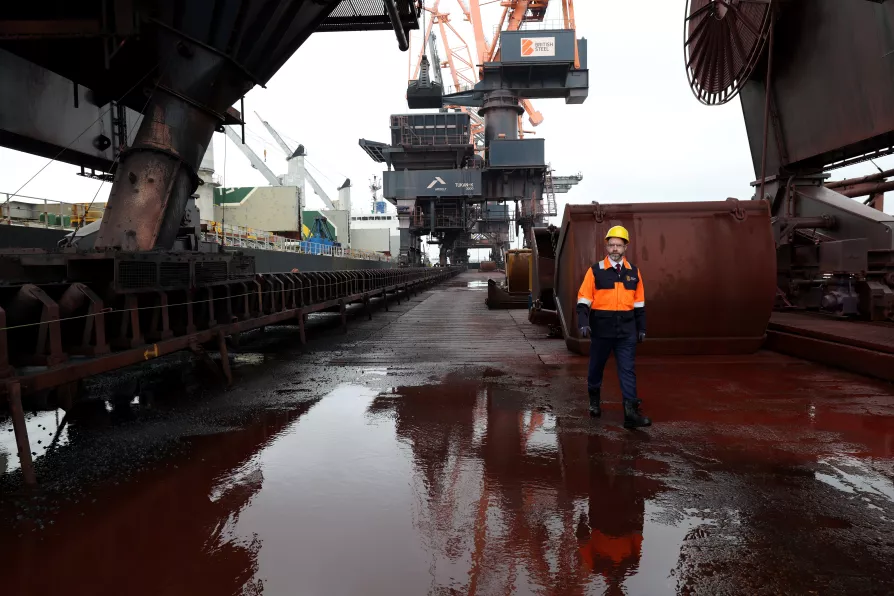
 Business Secretary Jonathan Reynolds arrives as coking coal is unloaded at Immingham Port, northern England, as he visits the site in Lincolnshire to view raw materials destined for British Steel at Scunthorpe, being off-loaded, April 15, 2025
Business Secretary Jonathan Reynolds arrives as coking coal is unloaded at Immingham Port, northern England, as he visits the site in Lincolnshire to view raw materials destined for British Steel at Scunthorpe, being off-loaded, April 15, 2025
THE CRISIS at Scunthorpe steelworks, rightly if belatedly being addressed in the immediate term by state intervention, is the consequence of privatising critical national infrastructure so decisions on its future rest on the profit-and-loss calculations of private companies.
Right-wing media and parliamentarians, who are pro-privatisation and pro-war, want to avoid this conclusion. So we are seeing a propaganda campaign to blame it on other causes, each of which advances the right’s agenda.
One is that it is the result of pursuing “net zero” policies aimed at reducing greenhouse gas emissions. In fact, a planned and publicly directed green transition is essential to Britain’s industrial future: it is leaving it to the market which places jobs and industry at risk.
Turning our backs on the climate crisis cannot be an option as extreme weather events and crop failures grow more serious with each passing year. Labour should face pressure not to drop its already much reduced climate commitments, but to invest in measures that directly help people — restoring its original ambitious plans to insulate 19 million homes in a decade, cutting emissions and lowering household energy bills, for example — to stop the climate-denialist right claiming green policies lower living standards.
The other is to turn Jingye’s record at British Steel into a “security risk” because the company is Chinese, scaremongering over other Chinese investments in Britain and calling for trade decoupling in line with the new cold war being pushed from Washington.
Here, socialists must take a clear position that distinguishes our opposition to any company not accountable to the British people controlling assets of strategic importance from a China-bashing narrative that raises international tensions and risks advancing the US-led war drive.
That doesn’t mean defending the behaviour of a firm like Jingye, which seemed designed to force the closure of the Scunthorpe blast furnaces and whose negotiations with government involved demanding huge sums of money while offering little in return.
But it does mean identifying the parallels between its conduct and, say, that of the Indian conglomerate Tata, which has also taken hundreds of millions in public money while refusing to save the blast furnaces at Port Talbot, a move set to cost thousands of jobs. The common factor is not the country of origin, but the lack of democratic accountability of companies not owned by the British public.
If maintaining a primary steel-making capacity is essential for national security, we need public ownership of the steel industry.
Claiming the only security risk is from countries our government defines as hostile — which the British government has been careful not to say of China, but faces pressure to do — does nothing to protect our industries from wreckage by private capital, a much more obvious threat.
It could also be used to justify forced takeovers, like US asset-manager Blackrock’s attempted acquisition of port facilities near the Panama Canal owned by Hong Kong-based CK Hutchison. In Panama, as concessions allowing the return of US military bases show, Washington has used unsubstantiated claims that China controls a key trade route to justify taking control of it itself.
Only a naive observer could look at the present regime in Washington and conclude US control of our assets would be less of a security threat.
Scaremongering over Chinese investments risks depriving us of a major trading partner, with knock-on effects on scientific and technological co-operation.
It also pushes us into the arms of a US administration which, unlike China, is explicitly committed to pressing companies to relocate production to its own shores; whose Project 2025 expresses a predatory interest in British assets, including NHS services; and whose international trade war agenda is pregnant with the risk of catastrophic military conflict.














